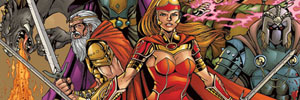#3 Shadow
#3 Shadow
The name was supposed to be ironic. At least it was, in his mind. Ever since the agra-factories stripped bare the topsoil in a harried response to the latest bout of famine, the dust began to blow. And ever since the ever-present dust hit the air, no one had shadows. So that was the name he took. No more Ted Franks, high school physics professor and amateur biologist.
That man had evaporated. To be fair, he knew he couldn’t just blame careless large-scale farm companies for the dissolution of Mr. Franks. No one could have predicted the massive storm that riddled the bible-belt with class five tornadoes during Easter Week. Or the genius wack-job who would take it as his sign and blow his dirty-bomb masterpiece all the way up and down the western bank of the Mississippi.
Even then, “Ted Franks†could have survived. He could have gotten out even after the contagious biological component to the bombs had been discovered and the steel wall had been raised, closing in what was now referred to as the “Q-Zone.â€Â Q for quarantine. He’d spent months trying to come up with some other witty meaning for it, but he was a science-guy, not a word-guy, and he wasn’t about to try and track down the English department. They had been bossy bitches even when the world had been normal.
Shadow didn’t doubt that he could have gotten out. He’d had proof positive of it when a contingent of hazmat-suited special forces types had come to his door. Well, they didn’t quite make it to his door. They stopped in the driveway where Shadow waited for them, shotgun not aimed but well in hand. They didn’t bother saying much, just handed him a cell phone and walked back to their hum-vee, leaning against it with arms crossed, letting him know real clear that they knew they weren’t out of gun-range and they didn’t give a fuck about it. Letting him know they were backing off so that he’d un-wad his panties, and not because they thought he was in any way a credible threat.
He didn’t blame them. Shadow knew he didn’t have a chance against these bastards, but he wanted them to be certain that he wasn’t going to go down easy. He could hear the drone flying somewhere way, way up there. Things had gotten so quiet around that that kind of thing was impossible to ignore. As was his sister’s voice, coming out tiny but insistent on the phone he was gripping, having somehow almost forgotten how to use it. Until he held it up to his ear and remembered exactly how much he hated these tiny bits of plastic you could never wedge between your chin and shoulder. He caught himself upraising his pinky, the effeminate curse these little machines always had on him.
His sister told him, in no uncertain terms, that he was to get in the damn truck and leave with the men. She mentioned his children. His family. His health. The average life expectancy of a Q-zone occupant. As if she knew. As if he’d ever run into a census-taker this side of the wall. And then she made the stupidest mistake she could have. She mentioned his ex-wife. He offered, in response, to be her correspondent instead. Which was met with frosty silence. Eventually he got a cell-phone with a solar recharge-pack out of the visit. And some rations, and even a promise of a cold beer if he stopped by the soldier’s checkpoint.
It wasn’t really his ex that kept him inside Q-zone. It was everything she represented, that average fucking soul-numbing life he had been leading. Spend the day saying the same damn things year after year to the same kids too busy trying not to give a fuck to be able to hear anything he said, then going home and watching the same bullshit tv, numbing himself to sleep with a couple of drinks. And weekends? Whatever.
His skills, his knowledge, amateur though it may be, was useful here. And everything he’d learned in boy scouts and ROTC made him some sort of an asset. He could talk to kids, too, which was a surprisingly useful skill, given how many young people had decided to stick around. And he didn’t blame them. They might have found themselves immune to the indecencies of the “shakes†disease, but many members of their families didn’t, and refused to go into the quarantined refugee camps on the other side of the wall. So the kids stayed. And when the sickened families died within months, after watching them die and burying them with their own hands, those kids simply couldn’t see themselves living “on the other side.â€Â Just like him.
He tended to forget that he wasn’t much older than them. They just seemed so damn young. And his own kids had a whole massively overbearing huge family to take care of them. These kids didn’t. So he stayed, not out of sheer mule-headedness, like he liked to pretend, but because these kids needed him. And he needed them.










